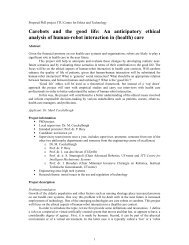Ethical issues in engineering design - 3TU.Centre for Ethics and ...
Ethical issues in engineering design - 3TU.Centre for Ethics and ...
Ethical issues in engineering design - 3TU.Centre for Ethics and ...
You also want an ePaper? Increase the reach of your titles
YUMPU automatically turns print PDFs into web optimized ePapers that Google loves.
8 Conclusions of the empirical study<br />
In this chapter conclusions are drawn based on the four case-studies with regard<br />
to the work<strong>in</strong>g hypotheses that were <strong>for</strong>mulated <strong>in</strong> chapter 3 <strong>in</strong> this chapter.<br />
These work<strong>in</strong>g hypotheses were:<br />
1a) The k<strong>in</strong>ds of ethical <strong>issues</strong> faced by eng<strong>in</strong>eers depend on <strong>design</strong> type<br />
<strong>and</strong> <strong>design</strong> hierarchy.<br />
1b) The ways <strong>in</strong> which eng<strong>in</strong>eers deal with these ethical <strong>issues</strong> depend on<br />
<strong>design</strong> type <strong>and</strong> <strong>design</strong> hierarchy.<br />
2a) In normal <strong>design</strong> processes a regulative framework is used by<br />
eng<strong>in</strong>eers to account <strong>for</strong> the decisions made on ethical <strong>issues</strong>.<br />
2b) This regulative framework fulfils all Grunwald’s requirements <strong>and</strong> is<br />
there<strong>for</strong>e a normative framework.<br />
The results from the cases are first summarized <strong>in</strong> section 8.1. Subsequently the<br />
empirical data with regard to work<strong>in</strong>g hypothesis 1a are discussed <strong>in</strong> section 8.2.<br />
It is argued that the empirical data only partly support this work<strong>in</strong>g hypothesis.<br />
Contrary to what was expected the <strong>design</strong> hierarchy does not seem to <strong>in</strong>fluence<br />
the k<strong>in</strong>ds of ethical <strong>issues</strong>. These <strong>issues</strong> only depend on <strong>design</strong> type. It will be<br />
shown that the empirical data only support a part of hypothesis 1b <strong>in</strong> section 8.3.<br />
The way eng<strong>in</strong>eers deal with ethical <strong>issues</strong> depends on <strong>design</strong> type <strong>and</strong> aga<strong>in</strong> no<br />
<strong>in</strong>fluence of <strong>design</strong> hierarchy was seen. It will also be argued that the empirical<br />
data are <strong>in</strong> accord with work<strong>in</strong>g hypothesis 2a. Eng<strong>in</strong>eers use a regulative<br />
framework to deal with ethical <strong>issues</strong> <strong>in</strong> normal <strong>design</strong>. They do not use<br />
regulative frameworks <strong>in</strong> radical <strong>design</strong>. The regulative frameworks encountered<br />
<strong>in</strong> this thesis do not fulfil Grunwald’s requirements. So work<strong>in</strong>g hypothesis 2b is<br />
not confirmed by the empirical data. This will be argued <strong>in</strong> section 8.4. Until<br />
now, I have considered the <strong>design</strong> problem <strong>for</strong>mulation to be given fact <strong>in</strong><br />
<strong>design</strong> processes. I discuss this assumption <strong>in</strong> section 8.5 <strong>and</strong> <strong>in</strong>dicate that the<br />
<strong>design</strong> problem <strong>for</strong>mulation is not completely fixed <strong>and</strong> eng<strong>in</strong>eers have ways to<br />
<strong>in</strong>fluence the <strong>design</strong> problem <strong>for</strong>mulation. This is highly relevant from an<br />
ethical po<strong>in</strong>t of view because the problem def<strong>in</strong>ition determ<strong>in</strong>es the <strong>design</strong> type.<br />
F<strong>in</strong>ally, an attempt is made to generalise the results from the cases <strong>in</strong> section<br />
8.6, this generalisation is done on empirical <strong>and</strong> conceptual grounds.<br />
153



